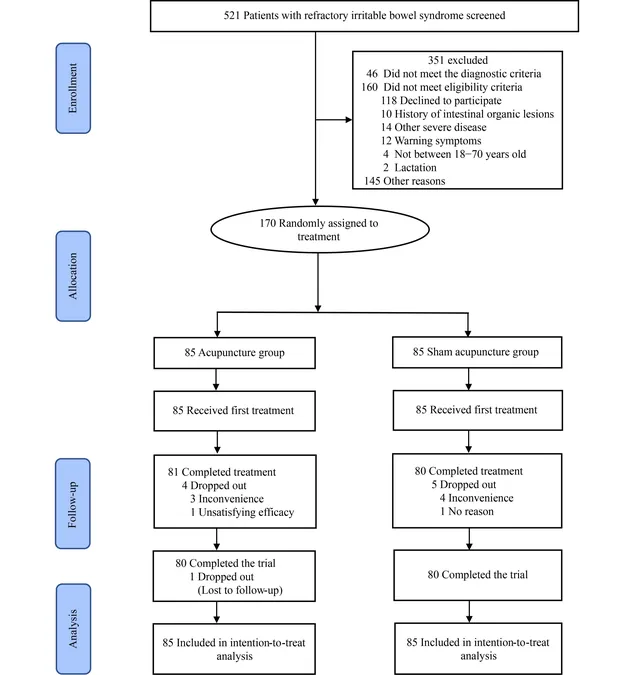
Revolutionary Study Shows Acupuncture Could Be Game Changer for IBS Sufferers!
2024-11-01
Author: Nur
Introduction
In a breakthrough study, acupuncture has been identified as a potentially effective treatment for refractory irritable bowel syndrome (IBS), a chronic gastrointestinal disorder that dramatically diminishes quality of life and frequently resists conventional treatments. This important finding could pave the way for new options for millions of IBS sufferers around the globe.
Study Overview
Conducted across multiple centers in China, the randomized controlled trial evaluated the effects of true acupuncture (TA) against sham acupuncture (SA) in patients who had failed to respond to standard interventions. The results were published in the influential journal *Frontiers of Medicine*, sparking renewed interest in alternative therapies for IBS.
Methods
The rigorously designed study included 170 participants aged 18 to 70 who were diagnosed with refractory IBS, adhering to the Rome IV criteria. Subjects were randomly assigned to either the true acupuncture group or the sham group at a 1:1 ratio. While the TA group received treatment at specific acupuncture points known to influence gastrointestinal health, the SA group experienced superficial needle placements nonexistent in established acupuncture practice. Over a four-week period, each group underwent 12 treatment sessions, all while continuing their usual care.
Results
Significant improvements were noted as participants in the TA group demonstrated a more substantial reduction in the Irritable Bowel Syndrome-Symptom Severity Scale (IBS-SSS) total scores when compared to the SA group. This highlights the true acupuncture's effectiveness in alleviating symptoms such as abdominal pain, bloating, and disruptions to daily activities. Remarkably, 50-point decreases in IBS-SSS scores—a milestone for tracking symptom relief—were significantly higher in those receiving true acupuncture.
Additionally, benefits were not fleeting; the positive effects of acupuncture persisted even four weeks following the end of treatment, suggesting a long-lasting impact that could enhance the lives of IBS patients. Quality of life metrics also showed improvement in the TA group, as assessed through the IBS-Quality of Life (IBS-QOL) questionnaire. Participants reported better overall well-being and even observed reductions in anxiety symptoms, although improvements in depression remained inconclusive.
Safety and Tolerability
Importantly, this study found that acupuncture was well-tolerated, with only mild, transient side effects such as minor bruising and temporary discomfort at needle sites.
Limitations
However, despite the promising outcomes, there were limitations to consider. The acupuncturists conducting the treatment were not blinded to the group assignments, potentially introducing bias. The research was limited to a Chinese population, which might affect the applicability of the findings to other countries with different healthcare systems and demographic characteristics. Moreover, the study didn't strictly control for other treatments the participants might have been using simultaneously, although efforts were made to track those variables.
Conclusion
In conclusion, this randomized controlled trial presents compelling evidence that acupuncture could serve as a viable auxiliary treatment for IBS patients who haven't found relief through standard therapies. This study significantly contributes to the field of integrative medicine, showcasing acupuncture's potential as an alternative treatment avenue.
Future Directions
Looking ahead, further research is needed to validate these results across various populations, including diverse demographics and geographic areas. Additionally, exploring the underlying mechanisms that make acupuncture effective for IBS may unlock even greater therapeutic potential. These findings could reshape the landscape for IBS management, bringing hope to those who have long suffered in silence.
Stay tuned for updates on this exciting research area that could transform how we tackle IBS—it's time to look at alternative treatments with renewed hope!






 Brasil (PT)
Brasil (PT)
 Canada (EN)
Canada (EN)
 Chile (ES)
Chile (ES)
 España (ES)
España (ES)
 France (FR)
France (FR)
 Hong Kong (EN)
Hong Kong (EN)
 Italia (IT)
Italia (IT)
 日本 (JA)
日本 (JA)
 Magyarország (HU)
Magyarország (HU)
 Norge (NO)
Norge (NO)
 Polska (PL)
Polska (PL)
 Schweiz (DE)
Schweiz (DE)
 Singapore (EN)
Singapore (EN)
 Sverige (SV)
Sverige (SV)
 Suomi (FI)
Suomi (FI)
 Türkiye (TR)
Türkiye (TR)